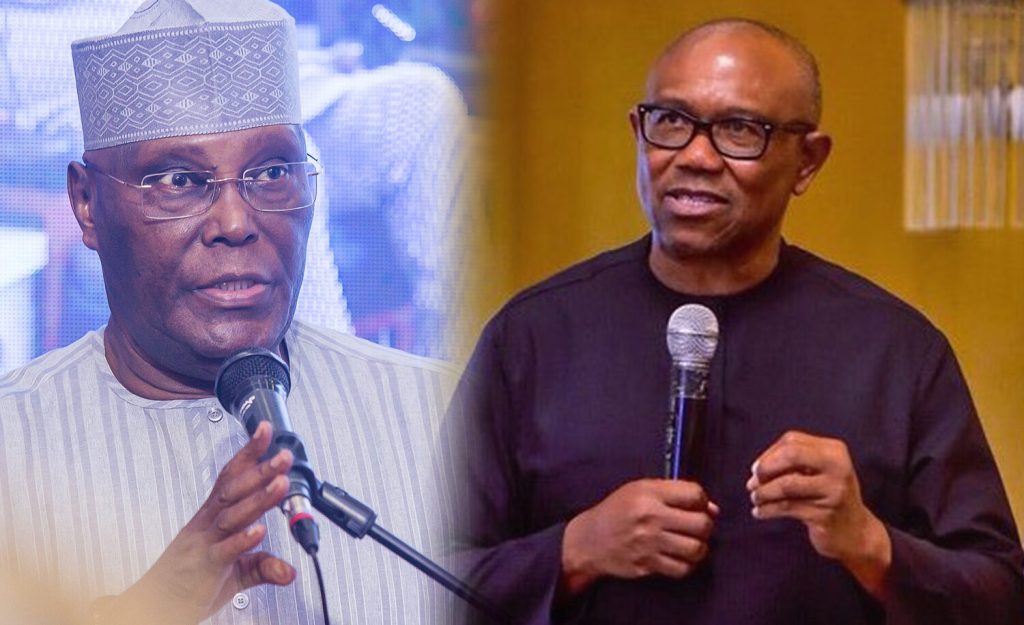By Olufemi Aduwo
As the 2027 general elections inch ever closer, it is imperative that opposition forces, fractured and disoriented in 2023, engage in a sober and honest introspection.
This introspection must be rooted not in emotion or ego, but in empirical data, historical precedent, and the logic of electoral pragmatism.
In the 2019 presidential election, fomer VP Atiku Abubakar of the People’s Democratic Party (PDP) secured 11,262,978 votes, while President Muhammadu Buhari of the All Progressives Congress (APC) polled 15,191,847.
A regional disaggregation tells its own story: However, the dynamics shifted considerably in 2023, with the emergence of Peter Obi under the Labour Party—a development that fundamentally altered the nation’s electoral landscape.
The official results of that election were:
Bola Tinubu (APC) – 8,794,726
Atiku Abubakar (PDP) – 6,984,520
Peter Obi (LP) – 6,101,533
Zone-by-zone breakdown of the 2023 results reveals stark changes: These figures tell a compelling story: Atiku Abubakar’s once-solid grip on the South-South, South-East, and North-Central regions has been fundamentally eroded.
In 2019, he secured 72% of the South-South and 80% of the South-East. By 2023, Obi had seized control, winning 84% in the South-East, leading in the South-South with 43%, and narrowly defeating Atiku in the North-Central.
This is not a marginal shift, it is seismic. No serious opposition platform can ignore such realignment.
That Peter Obi, running for the first time under a relatively nascent party, garnered over six million votes without the financial war chest or national machinery of the PDP points to an organic and growing support base, especially among Nigeria’s burgeoning youth population.
It is worth recalling that Atiku Abubakar himself was a key part of the 2015 opposition coalition that unseated President Goodluck Jonathan on the grounds that Jonathan reneged on a supposed internal understanding not to seek re-election.
Atiku has always presented himself as a unifier and an advocate of zoning and justice.
Ahead of the 2023 elections, he even stated that were the PDP to micro-zone the presidential ticket to the South-East, he would not contest.
That position resonated with many. Unfortunately, internal contradictions and the ambitions of then-Governor Nyesom Wike frustrated this moral clarity.
Wike pushed for a broader Southern zoning, only to later undermine the PDP from within.
Now, with Buhari out of the equation and the APC under Tinubu laying the groundwork for a northern succession in 2031, the opposition must reevaluate its relevance.
That both Peter Obi and Atiku Abubakar are currently aligned under the African Democratic Congress (ADC) is not a trivial coincidence—it is an historic opportunity. The convergence of necessity, justice, demographics, and political strategy may not present itself again.
The case for Peter Obi as the presidential candidate of a unified opposition is not built on sentimentality, but cold and hard logic.
Obi has demonstrated the ability to inspire Nigeria’s youth, win the trust of Southern electorates, and make electoral gains in the pivotal North Central region.
In 2023, he did not merely match Atiku in the Middle Belt, he outperformed him. That is not an accident; it reflects a shifting national consciousness, one which favours integrity, accountability and meritocracy over transactional politics.
The northern region remains electorally significant, no doubt. But Nigeria’s democracy is maturing. No single region can indefinitely dictate national outcomes. The lesson of 2023 is clear: a divided opposition assures APC victory. A united opposition, coalescing around Peter Obi with Atiku Abubakar’s wisdom and national network behind him, poses a genuine threat to APC dominance.
Peter Obi’s 2023 performance defied decades of political orthodoxy.
He proved that structure, while useful, is not invincible.
He dismantled long-standing political fortresses, converted supposedly peripheral regions into competitive zones, and sparked a civic movement that transcends ethnicity, religion, and class.
The ADC’s expanding structure may well provide the appropriate platform to consolidate these gains and project a credible, united front in 2027. But that window will not remain open indefinitely.
The numbers do not lie. The people have shifted. The tide has turned. The only question that remains is whether the opposition will read the signs—or sleepwalk, once again, into another cycle of avoidable defeat.
•Aduwo is President & Permanent Representative, Centre for Convention on Democratic Integrity Ltd/Gte (CCDI) to the ECOSOC, United Nations. He is the first Nigerian accredited by the UK Electoral Commission as a Foreign Election Observer in 2006, observed all general elections organised by INEC from 2003 to 2015, and served as Chief Technical Adviser to a foreign election observation mission in 2019 and 2023.

The post 2027 Realignment: Peter Obi, Atiku and the numbers that cannot be ignored appeared first on Vanguard News.

